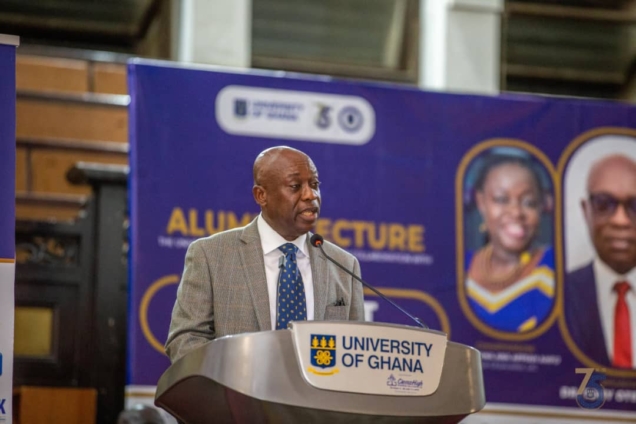Renowned Ghanaian businessman Anthony Oteng-Gyasi believes that the International Monetary Fund (IMF) and World Bank can guide Ghana and other African countries from poverty to economic prosperity.
During the 2023 Alumni Lecture at the University of Ghana, Oteng-Gyasi highlighted the success of China and other Asian Tigers, asserting that these economies flourished under the guidance of the two international financial institutions.
Oteng-Gyasi debunked the common belief in Ghana that “no country has developed under the watch of IMF and World Bank.”
He argued that this notion is clearly untrue. He emphasized that while many countries diligently adhere to recommendations of international institutions, Ghana and other African nations, influenced by pride and indiscipline, approach such advice with less commitment, resulting in limited economic growth.
The Managing Director of Tropical Cable and Conductor Limited credited the IMF and World Bank with playing a role in developing the Asian Tigers. He acknowledged the valuable policy advice from these institutions, ranging from the free zones concept to technology centers and tax policy guidance, which, if embraced, could contribute significantly to national development.
Oteng-Gyasi's thought-provoking lecture covered topics such as economic development, policy formulations, public sector procurement, rent-seeking, and other intellectually stimulating subjects. He attributed Ghana’s historical underperformance in manufacturing to the absence of a pragmatic manufacturing promotion policy, the lack of established value chains, and the allure of easier profit through importation.
The Chairman of the Board of the Ghana Revenue Authority highlighted that the International Finance Corporation faced challenges in identifying viable manufacturing projects in Ghana. He noted that a significant number of the nation’s top talents were more inclined to pursue lucrative public contracts for imported goods and services, rather than investing in and developing manufacturing industries.
Oteng-Gyasi emphasized that the lax enforcement of laws, particularly regarding import duty regimes and local content rules, has favored traders and importers over local producers.
This imbalance, he argued, has transformed the nation into one dominated by traders, resulting in the loss of quality manufacturing jobs that traditionally supported the middle class. The situation influences political strategies focused on appeasing the majority through low prices and free social programs to secure and retain political power.
Latest Stories
-
Agrihouse Foundation to honour Nana Konadu Agyeman-Rawlings at Gathering of The Royals
19 minutes -
2025 budget designed to drive growth, development and opportunities for all – Finance Minister
25 minutes -
Chieftaincy conflict: Security forces deployed to restore order at Bunkpurugu-Yunyoo
58 minutes -
Ramseyer Co-operative Credit Union celebrates 25 years of service
1 hour -
Group petitions Mahama over Kafui Danku, James Gardiner NFA appointments
2 hours -
Juliet Asante recounts challenges she faced as NFA Executive Secretary
2 hours -
Pro-Ukraine protests across US after Trump-Zelensky clash
3 hours -
Israel blocks entry of all humanitarian aid into Gaza
3 hours -
Legislature remains the heartbeat of democracy, need that recognition –Speaker Bagbin
4 hours -
TCDA highlights measures to reclaim 910 acres of encroached land at Wenchi Agricultural Station
4 hours -
MTN promises to execute Ambition 2025 Strategy despite economic challenges; records GH¢5.028bn profit in 2024
5 hours -
Coastal erosion in Volta Region: James Gunu declares ‘state of emergency’
5 hours -
Akpafu Todzi EP JHS housed in a weak structure
6 hours -
SONA was too brief on ‘galamsey’ but… – Ken Ashigbey
6 hours -
Minority boycotts orientation programme for MPs
6 hours

